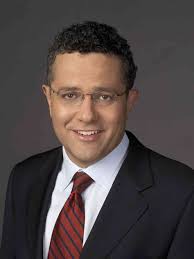The most recent version came from Jeffrey Toobin, in The New Yorker and was called "Our Broken Constitution." Subtitled, "Everyone agrees our government is not working. Are the founders to blame?" the piece quotes at length various critics of the constitution. Some argue that it is too democratic, especially since we began holding direct elections for senators. Others say that it's insufficiently democratic, and allows the president or small minorities or states to hold the majority hostage.
 |
| Jeffrey Toobin |
In "Should We Discard the Constitution?", David Cole points out that the Supreme Court has put a break on much needed and popular reforms, including affirmative action, voting rights, and election reform. He cites his friends and colleagues Mark Tushnet, Barry Friedman, Michael Klarman, and Louis Michael Seidman as scholars arguing that some or all of the system is fatally flawed.
 |
| Professor David Cole, Georgetown Law |
But as smart as the people must be, they are blinded by scholarly myopia. That is, they spend so much time focusing on the technical details of the document and its internal functioning that they miss the fundamental issue. The document and its system is only as good as the people who operate it. To make a lame analogy, the best coach in the world can not win a football game if his players are not talented enough to beat the opposition. If the people don't execute or understand the system, it can't work.
Take the filibuster, for example. I have never been sure that it is constitutional in its principles or application. It did very little serious damage, however, until people abused it and prevented the president from seating necessary federal officials. In the same way that 2nd Amendment advocates say that guns don't kill people, we can say that the filibuster may be dangerous, but only in the hands of killers.
Our representatives have to accept the rule of law and the concept of constitutionalism, or no reform can work. As John Adams wrote, “public virtue is the only foundation of Republics. There must be a positive passion for the public good, the public interest.” Although the system of checks and balances was designed to counteract the effects of corruption or self-interest to a degree, it could not function without the good faith of key people. No system is foolproof.
We don't need a better system, we need fewer fools.